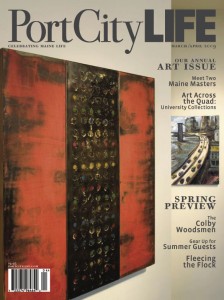The Maine Switch has published a profile of Grassoots Organic/GRO Cafe.
GRO chef Andrew Borne, who previously worked at a raw foods restaurant in Beverly, MA, explains that “when you cook foods, 90% of the nutrients are cooked off. We soak the nuts and seeds beforehand. (The soaking) gets rid of enzyme inhibitors, which helps digestion.”
This week’s Switch also includes an article by Back Bay Grill’s Chef/Owner Larry Matthews Jr. on cooking local lamb.
I purchase whole lambs for the restaurant from Sunrise Acres Farm in Cumberland Center from April through November. Purchasing the whole animal is a great opportunity for chefs (or a home cook with a good freezer). It allows a level of versatility that you don’t get when you buy single cuts and allows cooks to use more parts of the animal than otherwise would be put to use.
 The
The  The blog Portbrio has posted
The blog Portbrio has posted